The United States is prepared to stand with the Middle East in "a battle between good and evil," US President Donald Trump said in a speech in the Saudi capital Riyadh on Sunday, urging Arab leaders to confront "Islamist extremism."
Addressing leaders of about 50 Muslim-majority countries, Trump said the time had come for "honestly confronting the crisis of Islamist extremism and the Islamist terror groups it inspires."
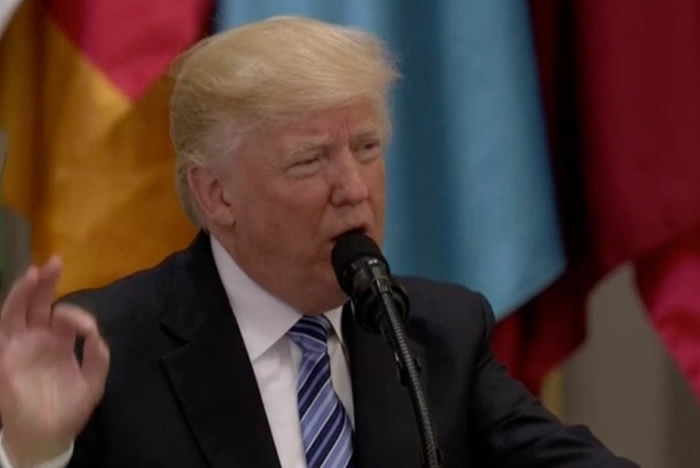
US President Donald Trump delivers a speech in Riyadh, Saudi Arabia on May 21, 2017. /AP Screenshot
The speech came on the second day of President Trump's first trip abroad – a visit overshadowed by his political troubles at home, particularly his sacking of FBI chief James Comey amid an investigation into potential ties between the Trump presidential election campaign and Russian officials last year.
On Saturday, the US signed trade deals of 350 billion US dollars with Saudi Arabia, including 110 billion dollar arms sales agreements – the largest arms deals ever made in the American history.
The US and Gulf Arab countries also agreed to coordinate their efforts against the financing of terrorist groups on Sunday, according to Reuters.
'Battle between good and evil'
The American president told Arab leaders that the fight against "Islamist extremism" was not "a battle between different faiths."
He called on the world to stand together against "the murder of innocent Muslims, the oppression of women, the persecution of Jews, and the slaughter of Christians."
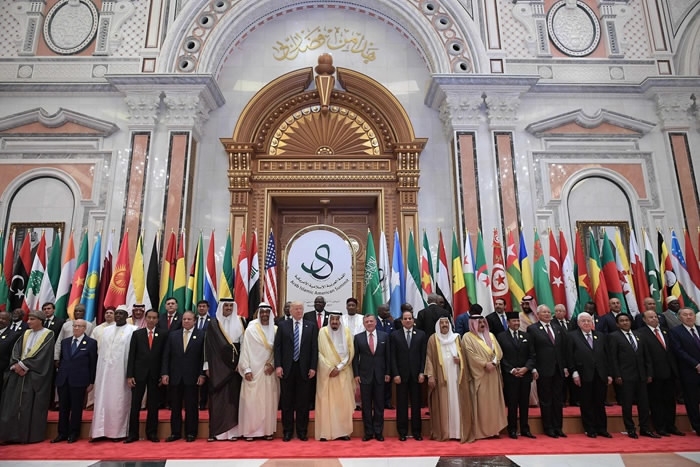
US President Donald Trump (C-L), Saudi Arabia's King Salman bin Abdulaziz Al Saud (C-R) and other officials attend the Arab Islamic American Summit at the King Abdulaziz Conference Center in Riyadh, Saudi Arabia on May 21, 2017. /VCG Photo
He appealed to Middle Eastern countries to play their part in fighting extremism. "America is prepared to stand with you... But the nations of the Middle East cannot wait for American power to crush this enemy for them," he said, urging those countries to decide "what kind of future they want for themselves, for their countries, and for their children."
Meanwhile, Trump added that he had come to the region as a partner, not a lecturer. "We are not here to lecture – we are not here to tell other people how to live... or how to worship. Instead, we are here to offer partnership – based on shared interests and values."
The US president did not mention his signature phrase "radical Islamic terrorism" in the speech.
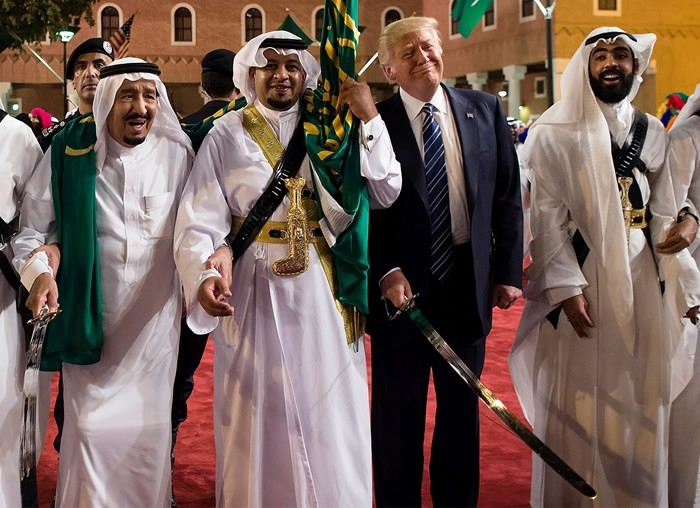
US President Donald Trump (R2) and Saudi Arabia's King Salman bin Abdulaziz Al Saud (L1) dance with swords at a welcome ceremony ahead of a banquet at the Murabba Palace in Riyadh, Saudi Arabia on May 20, 2017. /VCG Photo
Resetting relations with Muslim world?
By offering partnership to Middle Eastern countries and stressing the fight against terrorism was not about different faiths, Trump appeared to be attempting to reset his relations with the Muslim world.
Compared with his Islamophobic rhetoric and moves during the campaign and after the inauguration, Trump seemed to have softened his anti-Islam stance remarkably.
He made the phrase "radical Islamic terrorism" a staple of his campaign speeches last year and criticized then-President Barack Obama for not using it.
"We're also taking strong measures to protect our nation from radical Islamic terrorism," Trump said, using the term again in his first speech to a joint session of Congress as president on February 28.
During his campaign, Trump suggested creating a database of all Muslims living in the US and called for "a complete shutdown of Muslims" entering the country.
After taking office, he signed executive orders denying entry into the US by people from several Muslim-majority countries. The orders have been blocked by federal courts.
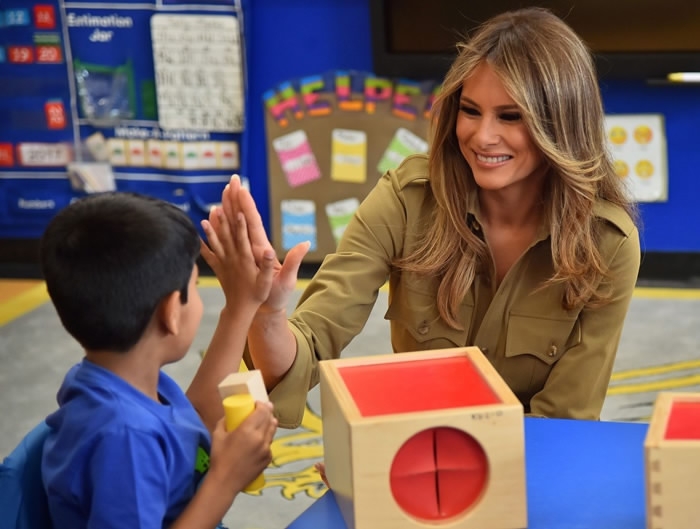
US First Lady Melania Trump (R) shares a laugh with a child during a visit to the American International School in Saudi capital Riyadh on May 21, 2017. /VCG Photo
From Obama 2009 to Trump 2017
Trump is the second consecutive American president to deliver a speech on US-Muslim relations in a Muslim-majority country during the first year of his presidency.
In June 2009, Obama addressed thousands of young students at Cairo University in Egypt, quoting the Koran and underscoring Islam's contributions to the world.
"I have come here to seek a new beginning between the United States and Muslims around the world; one based upon mutual interest and mutual respect; and one based upon the truth that America and Islam are not exclusive, and need not be in competition," he said, trying to turn a new page on the America's relationship with the Muslim world, which had worsened significantly during his predecessor George W. Bush's eight-year tenure.
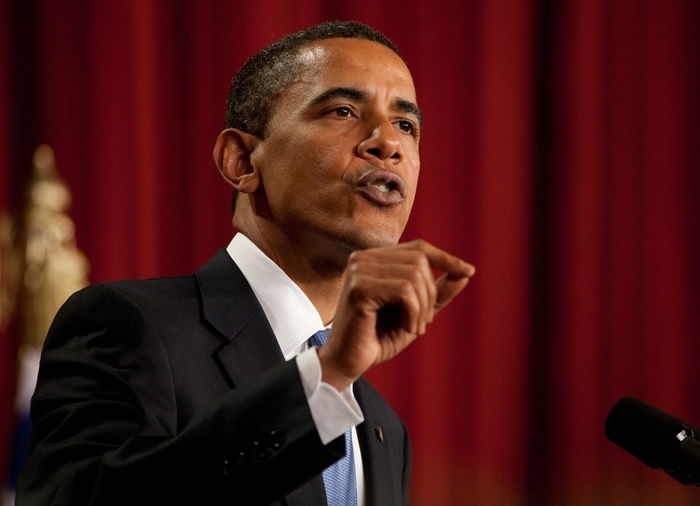
Then-US President Barack Obama delivers a speech at Cairo University in Egypt on June 4, 2009. /VCG Photo
However, with the emergence of ISIL in Syria and Iraq amid long-lasting violence across the Middle East as well as global terrorist attacks, the Obama administration failed to herald a major change in US policy in the region and did not fulfill the promise to pull all American troops out of Afghanistan.
It is still too early to tell where the US-Muslim relations will head under the leadership of Trump – a Republican president who pledged to "put America first" on the one hand but bombed Syria on the other.
Related stories:
Trump visit: US, Saudi Arabia ink deals worth blns USD
Trump travels to Saudi Arabia in bid to engage Muslim world
Domestic crises sour US President Trump's first foreign trip









